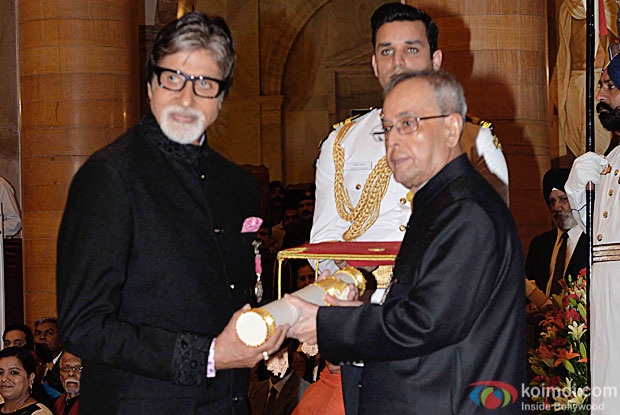When peak-time Amitabh Bachchan took a sabbatical from movies in the mid-‘90s, I ended his career-analysis with: “The throne is vacant. Who will occupy it?” No one could, then.
Two decades down, after being conferred India’s second highest civilian award, the Padma Vibhushan, where does he stand today?
Let us be clinical. Overall, Bachchan has the dreamiest run among our truly mammoth heroes—a small elite list comprising only of Prithviraj Kapoor, Ashok Kumar, Dilip Kumar, Dev Anand, Raj Kapoor, Shammi Kapoor and Dharmendra and no one else (the Khans will have to achieve a lot more!).

But Amitabh Bachchan’s incredible innings at his peak was more because of the combined vision, talent and brilliance of many frequent associates—beginning with Hrishikesh Mukherjee and going on to Prakash Mehra, Yash Chopra, Ramesh Sippy and Manmohan Desai, writers Salim-Javed and Kader Khan, lyricists Anand Bakshi and Anjaan, composers Kalyanji-Anandji, Laxmikant-Pyarelal, R.D. Burman and Rajesh Roshan, Kishore Kumar as his voice and b-o.-hot heroines Raakhee, Zeenat Aman, Rekha and Parveen Babi. Complementing him also were Shashi Kapoor, Vinod Khanna, Shatrughan Sinha and Rishi Kapoor. And Bachchan has always acknowledged this.
Clinically again, Bachchan, like so many of his times, relied less on script quality and more on people and relationships. This is where he became extraordinarily lucky, because he happened to associate with the cream of talents who showcased his matchless voice and formidable talent to the maximum.
A friend always talks about the secret of Bachchan remaining perennially-relevant—his uncanny skill of homing in on the best of new, young directors, come Mukul S. Anand then or R. Balki now. The results might have been mixed, but the quality was consistent.
Another visionary stroke that few recall because it misfired then for many reasons—Bachchan was the first independent entity to go corporate with ABCL (Amitabh Bachchan Corporation Limited), later AB Corp!
Nevertheless, we would like to believe that the real Bachchan surfaced only after 2000, when he realized that he was still wanted by both industry and audiences (with Mohabbatein and his iconic TV show Kaun Banega Crorepati). His growing connect with the common people and fans (through KBC, his blogs and now tweets) brought him closer to reality and boosted his confidence.
This was when he annexed the National award twice, for two of his boldest roles – Black and Paa, and did path-breaking movies like Baghban, Khakee, Sarkar, Eklavya, Cheeni Kum and Bhoothnath (and its sequel) that also included his three most criticized turns ever—Boom, Nishabd and Ram Gopal Varma Ki Aag.
This was the phase when he did a Malayalam and two English movies (one from Hollywood) and even a television serial. And a whole lot of social, humanitarian and other activities. Whether selling tourism in Gujarat, saving tigers or fighting tuberculosis, Bachchan influences people even now, and therefore, I would urge the industry to keep him away from routine roles. For Bachchan is special.
Today, in a way, his career comes full circle, as his next release Piku also sees him as Bhaskar Banerjee, the name of his memorable character in his first hit, Anand. The man who started out in arty films like Bhuvan Shome (as narrator) and Saat Hindustani soon became the face of mainstream Indian cinema to the globe and is now an icon for Indians.
Let’s get set then for a new phase in Bachchan’s lofty journey—towards higher triumphs and, perhaps, the Dadasaheb Phalke!
– Rajiv Vijayakar, a Senior Journalist, Film & Music Critic and Historian for Hindi cinema and Film Music is also an Author and Twice Jury Member at 58th and 62nd National Film Awards.
Rajiv Vijayakar tweets @rajivvijayakar
Download Our New Box Office App And Enjoy Reading Box Office Updates & Archives On Your Android Phone.



 Follow Us
Follow Us









